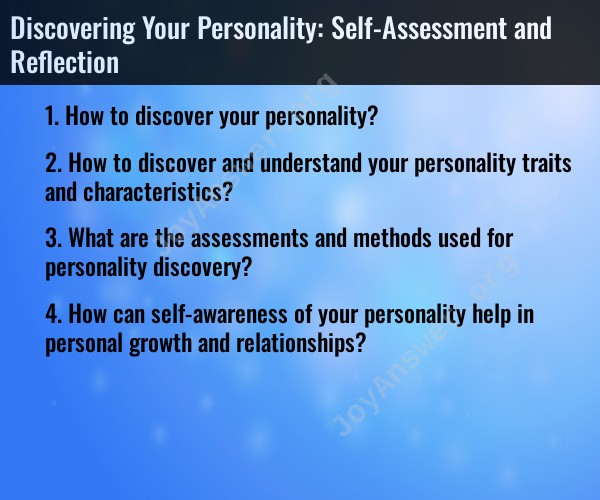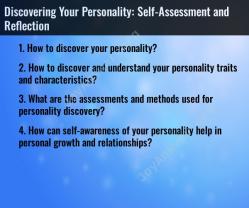How to discover your personality?
Discovering your personality involves self-assessment and reflection. It's a process of gaining insights into your thoughts, feelings, behaviors, and tendencies. Here are steps to help you discover your personality:
Self-Reflection:
- Start by setting aside time for self-reflection. Find a quiet, comfortable place where you can think without distractions.
- Ask yourself open-ended questions like: "What are my values? What are my strengths and weaknesses? What do I enjoy doing in my free time? What motivates me?"
Self-Assessment Tools:
- Consider using self-assessment tools and personality tests. There are many reputable assessments available, such as the Myers-Briggs Type Indicator (MBTI), the Big Five Personality Test, or the Enneagram. These tools can provide insights into your personality traits and preferences.
Seek Feedback:
- Ask for feedback from friends, family, or colleagues. They may offer valuable insights into your personality based on their observations of your behavior and interactions.
Journaling:
- Keep a journal to document your thoughts and emotions. Write about your daily experiences, how you respond to challenges, and what brings you joy. Over time, patterns in your thoughts and feelings may reveal aspects of your personality.
Past Experiences:
- Reflect on your past experiences, including successes and failures. How did you handle challenges? What did you learn from your mistakes? Your reactions and behaviors in the past can provide clues about your personality.
Values and Beliefs:
- Consider your core values and beliefs. What principles guide your decision-making and moral compass? Understanding your values can shed light on your personality.
Interests and Hobbies:
- Explore your interests and hobbies. What activities do you enjoy? Your passions and pastimes can reflect your personality and preferences.
Social Interactions:
- Analyze your social interactions and relationships. How do you behave in different social settings? Are you introverted or extroverted? How do you communicate with others? Your interpersonal style can reveal elements of your personality.
Strengths and Weaknesses:
- Identify your strengths and weaknesses. Recognizing areas where you excel and areas where you struggle can provide insight into your personality traits.
Feedback from Assessments:
- If you've taken personality assessments, carefully review the results. Pay attention to the descriptions and explanations of your personality type or traits. Compare the results to your self-reflection and experiences to see if they align.
Discussion and Counseling:
- Consider discussing your self-discovery journey with a therapist or counselor. They can offer guidance and interpretation of your personality traits and help you explore your self-concept.
Acceptance and Growth:
- Understand that personality is not static and can evolve over time. Embrace your strengths and work on areas for improvement. Use your self-discovery to set personal and professional goals.
Remember that personality is multi-dimensional and complex. It's a combination of genetic predispositions, life experiences, and individual choices. Your personality can encompass a range of traits and characteristics, and it may evolve as you grow and learn. The key to self-discovery is to approach the process with an open mind, patience, and a willingness to learn more about yourself.
How to discover and understand your personality traits and characteristics?
There are a number of ways to discover and understand your personality traits and characteristics. Some of the most common methods include:
- Introspection: This involves reflecting on your own thoughts, feelings, and behaviors to identify your personality traits. You can do this by keeping a journal, meditating, or simply taking some time to think about yourself.
- Feedback from others: Asking friends, family, and colleagues for their feedback on your personality can also be helpful. They may be able to point out traits that you are not aware of or that you are struggling with.
- Personality tests: There are a number of personality tests available online and in books. These tests can help you to identify your dominant personality traits and to learn more about your strengths and weaknesses.
What are the assessments and methods used for personality discovery?
Some of the most popular personality assessments and methods include:
- The Big Five Personality Test: This test measures five broad personality traits: openness, conscientiousness, extraversion, agreeableness, and neuroticism.
- The Myers-Briggs Type Indicator (MBTI): This test classifies people into one of 16 personality types based on their preferences for four dichotomies: extraversion/introversion, sensing/intuition, thinking/feeling, and judging/perceiving.
- The Enneagram: This model identifies nine different personality types, each with its own unique set of strengths and weaknesses.
How can self-awareness of your personality help in personal growth and relationships?
Self-awareness of your personality can help you in a number of ways, including:
- Personal growth: Understanding your personality traits can help you to set realistic goals, develop your strengths, and work on your weaknesses.
- Relationships: Understanding your personality and the personality of your partner can help you to communicate more effectively, build trust, and resolve conflict.
Here are some specific examples of how self-awareness of your personality can be helpful:
- If you are an introvert, you may need to schedule some time for yourself to recharge after social events.
- If you are an extrovert, you may need to be mindful of how much you talk and avoid talking over others.
- If you are a conscientious person, you may need to be careful not to be too critical of yourself or others.
- If you are an open person, you may need to be mindful of how much information you share with others.
By understanding your personality, you can make choices that are aligned with your values and goals. You can also build stronger relationships with others by understanding their personality and communicating in a way that they can understand.


